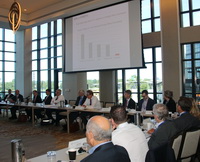The Supreme Court yesterday ruled 5-4 in South Dakota v. Wayfair to expand States' authority to collect sales and use taxes on Internet consumer purchases from retailers who do not have a physical presence in a state.
 |
The Supreme Court yesterday ruled 5-4 in South Dakota v. Wayfair to expand States' authority to collect sales and use taxes on Internet consumer purchases from retailers who do not have a physical presence in a state. |
ICSC President and Chief Executive Officer Tom McGee said, "We understand this is a major step in a long process, but look forward to working with policymakers and business owners to find state-level legislative solutions which promote fairness and competition." (CoStar News, June 21)
The Roundable's DeBoer added, "We stand ready to assist policymakers should they respond to today's decision with legislation that provides our nation's businesses with fair standards to collect the tax that is owed on online sales." (Roundtable Statement, June 21)
The Treasury Department on June 20 designated more than 8,700 low-income census tracts in the United States, Puerto Rico, and territories as qualified Opportunity Zones. (IRS Notice 2018-48)
 |
A Roundtable Tax Policy Advisory Committee working group is finalizing a comment letter to the Treasury Department and IRS with recommendations on how to structure implementing rules that facilitate productive real estate investment. |
A TPAC working group is finalizing a comment letter to the Treasury Department and IRS with recommendations on how to structure implementing rules that facilitate productive real estate investment. The letter will address topics such as the Opportunity Fund certification process, the requirements necessary for real estate to be treated as a qualified Opportunity Zone investment, and the tax consequences of real estate asset sales and acquisitions by an Opportunity Fund during the holding period.
Marking the half-year anniversary of the final passage of the Tax Cuts and Jobs Act (TCJA), House Ways and Means Committee Chairman Kevin Brady (R-TX) joined Speaker Paul Ryan (R-WI) and Secretary of the Treasury Steven Mnuchin in recognizing the law's benefits to American taxpayers and businesses. (Video, National Association of Manufacturers, June 21)
 |
House Ways and Means Committee Chairman Kevin Brady (R-TX), center, was awarded The Real Estate Roundtable's Champion of the Economy Legislative Leadership Award for his efforts on the Tax Cuts and Jobs Act. |
In his acceptance comments, Brady noted that the Ways and Means Committee is “continuing to clarify new parts of the tax code, work with Treasury and get technical corrections made.” Brady also said his goal is to continue encouraging growth and investment. “Early signs are very encouraging. The best is yet to come.”